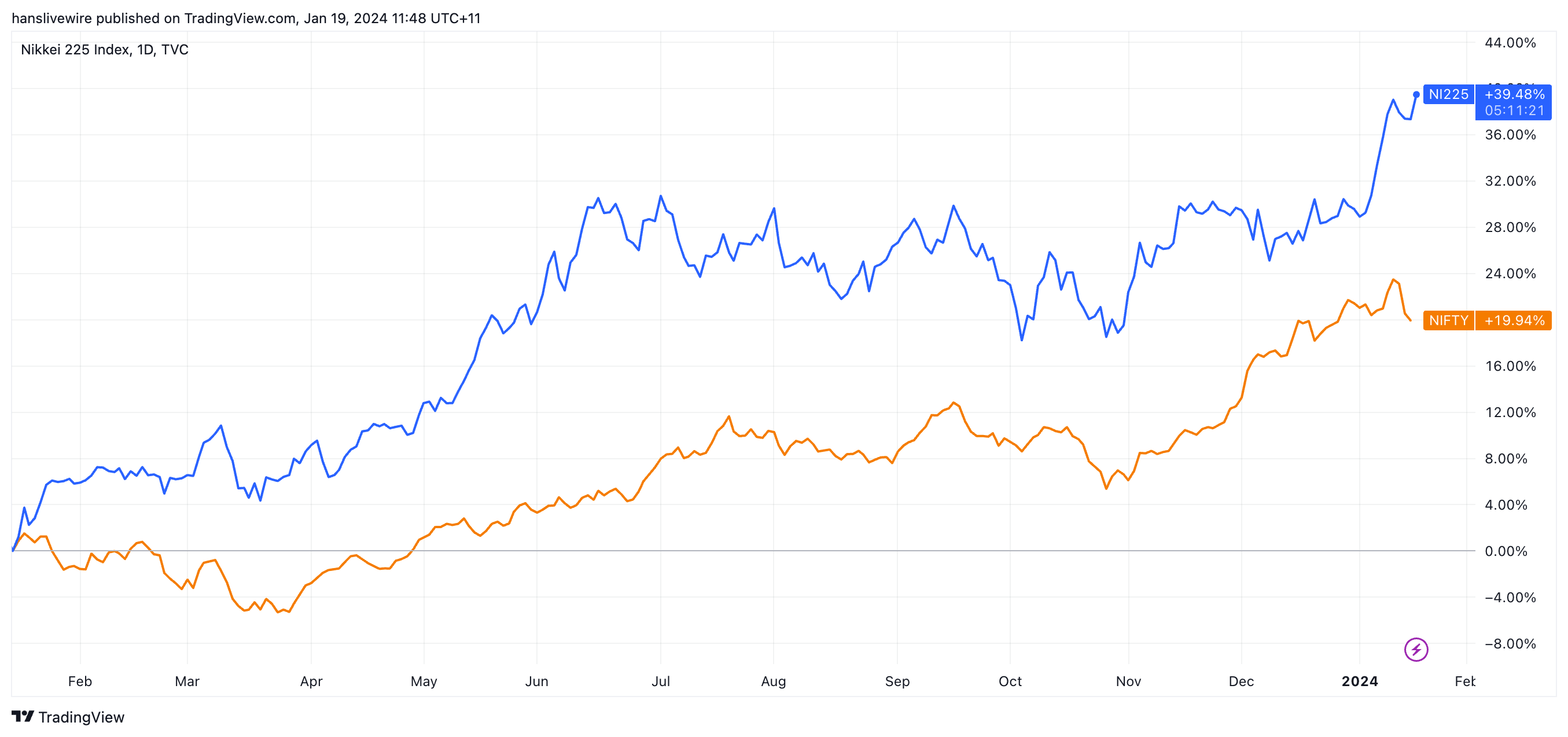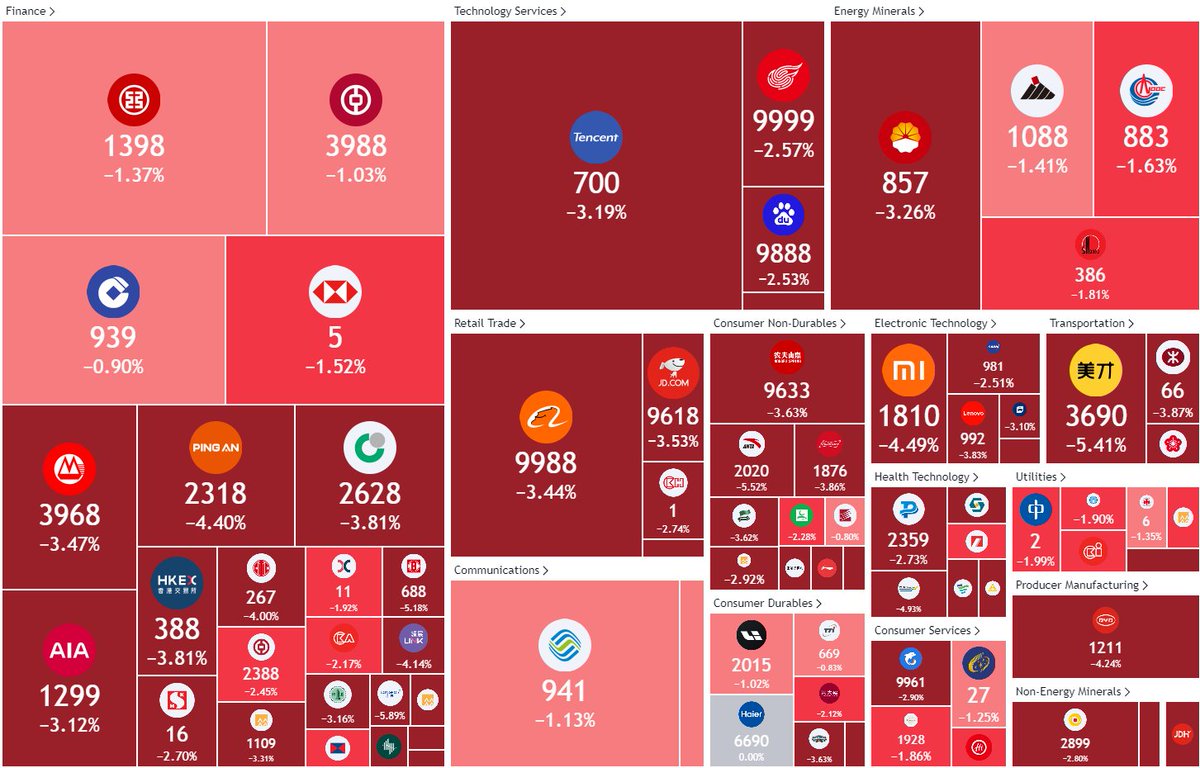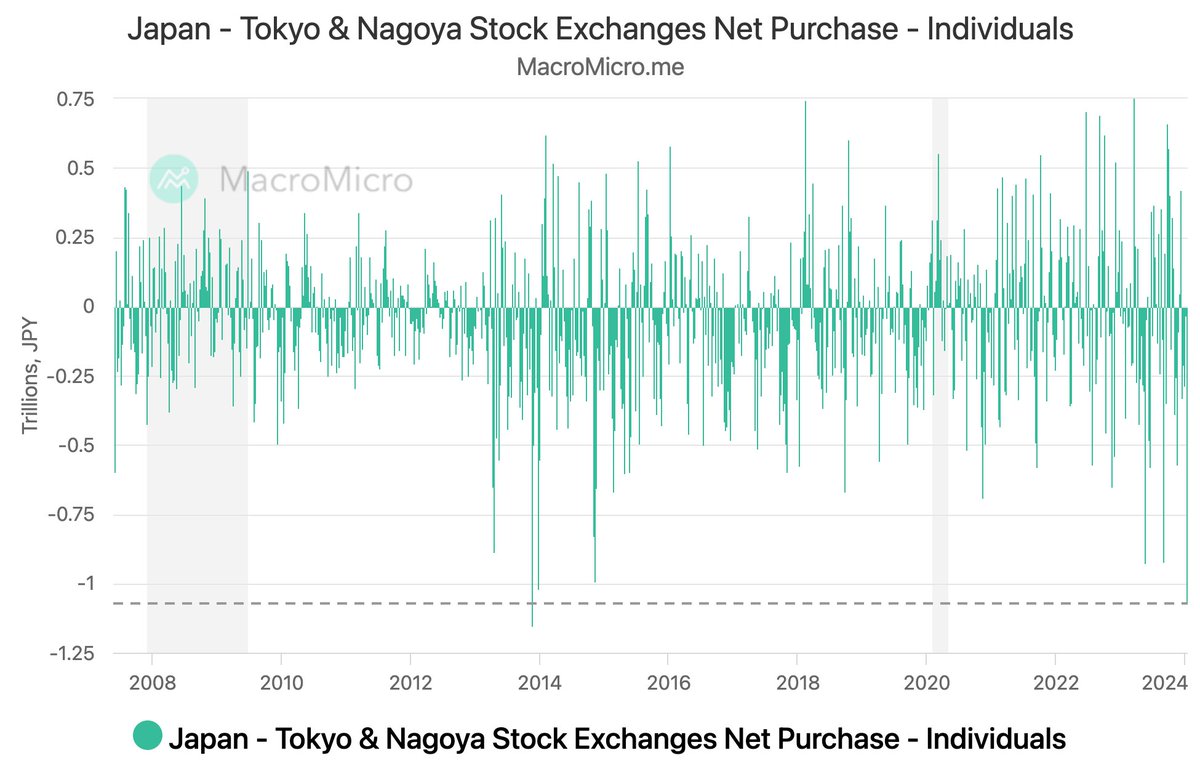Chinese, Japanese, and Indian stocks are diverging: What it means for Australian investors
When you think of investing in global equities, most people will naturally think of the opportunity in the United States. But this week has shone more light on a part of the global stock market that doesn't always get as much attention.
Chinese stocks have had their worst start to a calendar year since 2019 (2016 if you count the Hang Seng) while Japanese and Indian stocks simultaneously hit all-time highs. And if you believe the technicals (or in my case, my colleague Chris Conway), there is no reason why this will stop.

So, how have Japan and India continued to rally in the face of a slew of geopolitical headwinds? And how did Chinese stocks go from a "bargain" to a "value trap" in just a few years?
As another of my colleagues would say, let's dive in.
The Middle Kingdom's market woes
On Thursday, the Hang Seng Index - or the Hong Kong benchmark equity market index - fell 3.7% in one day. The fall is the largest intra-day drop in more than a year, with every stock in the index falling by the close.
As my ex-colleague and current City Index market analyst David Scutt put it, there's more red in the Hong Kong stock market than the erupting volcano in Grindavik, Iceland.

In mainland China, the CSI 300 fell to its lowest level in nearly five years despite Beijing declaring the country had reached its economic growth goals. The index is down 15% in the last six months alone and it closed out 2023 with its longest weekly losing streak for 11 years. Incidentally, that streak is still going.
The largest individual sector in both stock markets is the diversified financials space - and just like it is in Australia, this encompasses banks, insurance companies, and conglomerates.
Unfortunately for investors who are in it, the Hang Seng Index financials sector is down by more than 22% in the past 12 months. And the technicals for the property sector, be it Shanghai or Hong Kong-listed, look just as unappetising. You can read the charts in this piece by my colleague Carl Capolingua.
Meanwhile, in Japan and India...
It's all green on the screen. The Japanese stock market continues to test all-time highs and investors are helping that cause in droves. Last week, foreign investors bought more Japanese stock than at any time since mid-last year.

The Bank of America, which runs the famed Fund Manager Survey, found that Japan stands out on both the economic and market front. 27% of surveyed managers expect the Japanese equity market to return more than 10% this calendar year. A timely pivot in monetary policy from the Bank of Japan could change this but given the Yen is at multi-decade lows and the Japanese economy recently exited deflation for the first time in 25 years, it's hard to see interest dying down at a macro level.
As for whether the rally can continue, most money managers are of the view espoused by Daniel Hurley, portfolio specialist for Emerging Markets and Japanese Equities at T. Rowe Price:
"I believe that, more broadly in 2024, the reasons that the market did so well in 2023 – currency weakness, resilient global growth and corporate governance reform – all look set to continue," Hurley wrote in a media note this week.
"Japan’s TOPIX index has around 50% of revenues coming from outside Japan. Therefore, the weak Japanese yen makes those exporters increasingly competitive with the yen weakening by 50% over the past two years and the resilient global economy means that the global exporters haven’t suffered a weak demand environment," he added.
For those who are not as bullish, they have either already taken some profits or believe the rally has become too consensus-like. The exception to this rule is Herald van der Linde, head of Asia equity strategy at HSBC:
"Everybody is well positioned for it, everybody's bought into it. So it might be that a lot of the good news is now priced in," van der Linde told Reuters this week.
In India, the story is similar in the sense that the world's largest democracy is considered the best place to earn returns in emerging markets. Stocks like HDFC Bank (NSE: HDFCBANK) and Infosys (NSE: INFY) have captured the imagination of foreign investors given the country's huge addressable market. India is also considered a top trade in the aforementioned Bank of America Fund Manager Survey.
What is different about India compared to China or Japan is the demographic and political story. Nearly 80% of its population is under 50 years old (unlike China and Japan which both bear ageing populations and a lack of children to replace them). Politically, India will go to the polls mid-year and as Lazard Asset Management points out, a third term with Narendra Modi as Prime Minister could have some incredibly important consequences:
"The coming years may be crucial in determining whether India can capitalise on the opportunities presented by friend-shoring or China Plus One supply chain strategies to develop a large, productivity-boosting export manufacturing base," Lazard strategists wrote this week.
As for the market itself, there's a growing concern that the rally in the Nifty 50 (India's benchmark equity market index) has reached its temporary peak. The next catalyst for another rally may come if the Reserve Bank of India cuts interest rates - and that isn't expected until the second half of this year at the earliest.
So why does this matter to Australian investors?
From an economic standpoint, the slump in China has more consequences than the rallies in India and Japan. China is Australia's largest trading partner and while the stock market is not the economy, there is no question that a broad slowdown is happening in the world's second-largest economy.
From a market standpoint, Australian investors have been shunning the materials index with the XMJ down 8% in January alone. The weaker Australian Dollar may be good news for our exports, but it isn't much help if there is no one at the other end to buy them.
Foreign investors also use Australia as a risk proxy. A significant downturn in the Chinese stock market could lead to broader risk aversion, driving investors away from riskier assets like Australian equities, even if they're not directly exposed to China.
For the brave investor (or those with a contrarian view), broad-based exposure to China can be gained through the VanEck FTSE China A50 ETF (ASX: CETF) or for large-cap exposure only, the iShares China Large-Cap ETF (AU) (ASX: IZZ). In the Livewire funds stable, only one firm runs a China-exclusive fund (listed below) but others run emerging market funds in which Chinese stocks make up the largest individual regional exposure.

For the individual stock picker, Kingsley Jones of Jevons Global picked eight Chinese stocks he's backing in 2024. Investors with access to individual stocks through an eligible broker might be interested to read this piece by Kingsley Jones.
But Japan and India's rallies both have important implications for Australia too. Japan is now Australia's second-largest trading partner and Australian tourists have been heading to the Land of the Rising Sun in droves. On the corporate front, Japanese conglomerates have a big presence all around the world. As recently as December 2023, SoftBank bought a little-known ASX-listed company that specialises in robots that clean shopping centres. No, I'm not joking.
The primary avenue of exposure for retail investors to Japan is in ETFs - namely BetaShares Japan ETF - Currency Hedged (ASX: HJPN) and the iShares MSCI Japan ETF (ASX: IJP). In the managed funds space, Platinum Asset Management runs a Japan-specific fund as does the team at Martin Currie.
In the case of India, the country is a major consumer of resources like coal and iron ore, which are also key Australian exports. A stronger Indian economy fuelled by a rallying Nifty 50 could lead to increased demand for these resources, potentially benefiting Australian resource companies and pushing up prices.
Two of Livewire's partners run India-specific funds - namely:

and

The two largest ETF providers by AUM in Australia also run India-specific products: Global X NAM India Nifty 50 ETF (ASX: NDIA) and the BetaShares India Quality ETF (ASX: IIND).
Finally, a reminder that any products quoted in this wire are purely for information and are not intended as investment advice. As always, speak to a qualified financial adviser and do your own research.
6 stocks mentioned
9 funds mentioned
3 contributors mentioned

